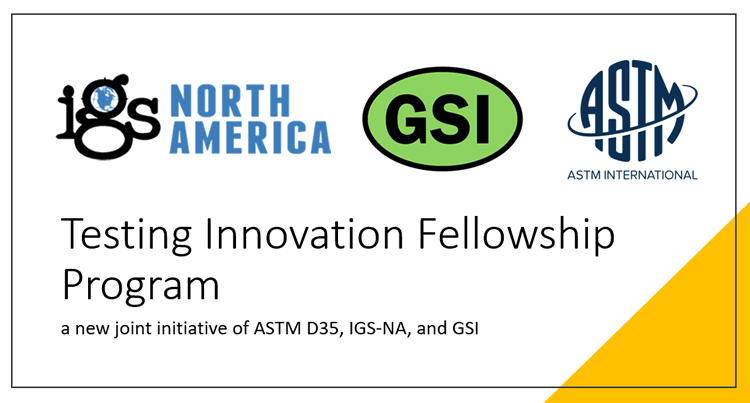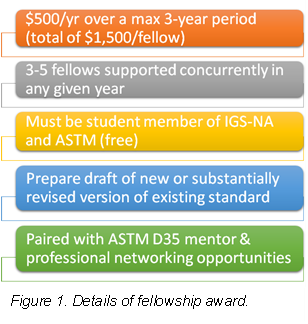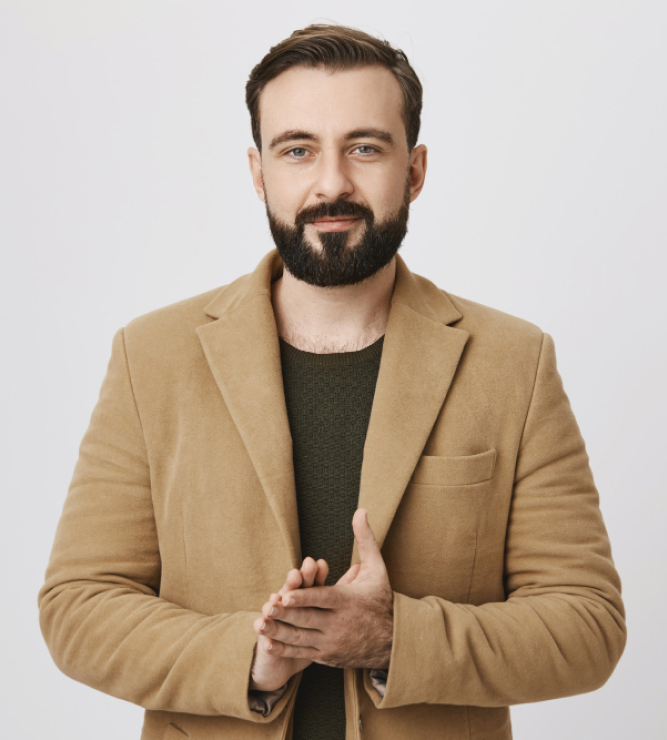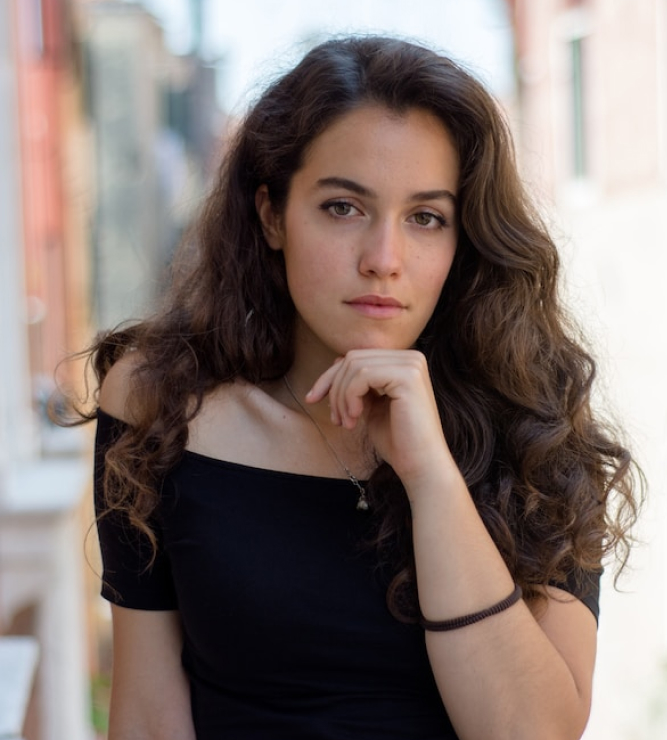By Kristin Sample-Lord, PhD, PE — The year 2022 began with a transformative start for the geosynthetics community. The North American Chapter of the International Geosynthetic Society (IGS-NA) joined forces with the ASTM International Committee D35 on Geosynthetics and the Geosynthetic Institute (GSI) to launch a new student fellowship program.
The Testing Innovation Fellowship Program is truly unique, as it is specifically targeted at (1) transitioning geosynthetics-related research to ASTM standards, and (2) increasing student and young member engagement in geosynthetic professional organizations. The program aligns with the combined missions of GSI, IGS-NA, and ASTM to develop and transfer knowledge, geosynthetic technologies, and testing standards to positively impact education, public health and safety, consumer confidence, and overall quality of life.
The details of the fellowship program are summarized in Figure 1. Fellows are awarded $500 per year, over a maximum three-year period ($1,500 total per fellow). Between three to five fellows are supported concurrently in any given year. Both IGS-NA and ASTM offer free student memberships, and the fellows must become student members to be eligible for the program.
As a deliverable of the fellowship, students must prepare a draft of either a new ASTM standard or a substantially revised version of an existing standard.
Want to join IGS North America as a student? Simply fill out this short form.
To guide the students through the standardization process, each fellow is strategically paired with a D35 committee mentor with expertise in the research topic area (Figure 2). In addition to supporting the success of the fellow, this mentorship aspect of the program also provides valuable networking and professional development opportunities for the students. Fostering meaningful and extended (i.e., 3-year) engagement with the students is expected, to lead to future young members of IGS-NA and ASTM International that are invested in the future of the organizations. For the mentors, they can meaningfully engage with young members (and potential future colleagues) and stay abreast of the latest developments in geosynthetics research.
This past January, the 2022 student recipients kicked off their fellowships by presenting their proposed work to ASTM D35, IGS-NA, and GSI members at ASTM Committee Week. The excitement surrounding the new fellowship program was palpable, and all three organizations are looking forward to continuing to support and grow the program.
“We are very proud of the GSI / IGS-NA / ASTM Testing Innovation Fellowship award,” says Dr. Koerner. “Mentors are helping graduate students grow and develop in the Geosynthetic profession through this award. We want them to learn the ropes at ASTM and network with the IGS membership during the process. In addition, we want them to receive guidance as well as being seen and heard in a very hands-on, positive and important role of standards development. Finally, we would like to have them gain support from stakeholders in our industry so that they are comfortable growing within the profession.”
FIELD RESPONSE
The Fellowship Program has received strong support from across the profession. Notably, one of the field’s most significant contributors, Dr. JP Giroud, wrote the following:
The Testing Innovation Fellowship Program is a remarkable initiative and I would like to put in in the perspective of the geosynthetics discipline. Historically, the geosynthetics discipline has been developed around a family of products, the geosynthetics. The various types of geosynthetics have a variety of properties. These properties must be evaluated quantitatively because the geosynthetics discipline is an engineering discipline, and engineering is done with numbers. The numbers that quantify properties are generated by tests, and the numbers are reliable if the tests are performed in accordance with well-established procedures, hence the importance of standardization of the tests. Sometimes, it is hinted that standardization may stifle innovation. This should never happen to the geosynthetics discipline, because innovation is the engine that drives the geosynthetics discipline. Indeed, new types of geosynthetics appear periodically thanks to the vitality of the geosynthetics industry, and new materials, sometimes subtle additives, improve the performance of existing geosynthetics. These innovations generate a need for new tests or for modifications of existing tests. Clearly testing innovation must go with geosynthetic innovation. Therefore, I encourage students interested in geosynthetics to participate in the Testing Innovation Fellowship Program. By participating in this program, students will learn about geosynthetics and become active members of the geosynthetics discipline. In addition, students will bring the expertise that young generations have in the practice of digital technology, which is essential for testing innovation. Therefore, I can say that the Testing Innovation Fellowship Program is beneficial to both students and the geosynthetics discipline.
JP Giroud
Past President of the International Geosynthetics Society
Member of the US National Academy of Engineering
www.jpgiroud.com
NEXT FELLOWSHIP OPPORTUNITIES
The call for applications (and renewals) will typically occur in October each year. The fellowship program was developed, implemented, and is managed by the Fellowship Board, which includes Kristin Sample-Lord (IGS-NA Board Member), Kent von Maubeuge (D35 Sub-committee Chair), and George Koerner (GSI Director). There is also a financial sub-committee that steers financial management of the fellowship program, which includes John Allen (IGS-NA President), Gary Torosian (ASTM D35 Chair), and Jamie Koerner (GSI General Manager).
For further information about the program or how you can support the initiative, please contact info@igs-na.org
Kristin Sample-Lord, PhD, PE (Villanova University) is the IGS Vice President – University Outreach and co-chair of the 13th International Conference on Geosynthetics (13 ICG), which IGS North America will host in Montreal in September 2026.





